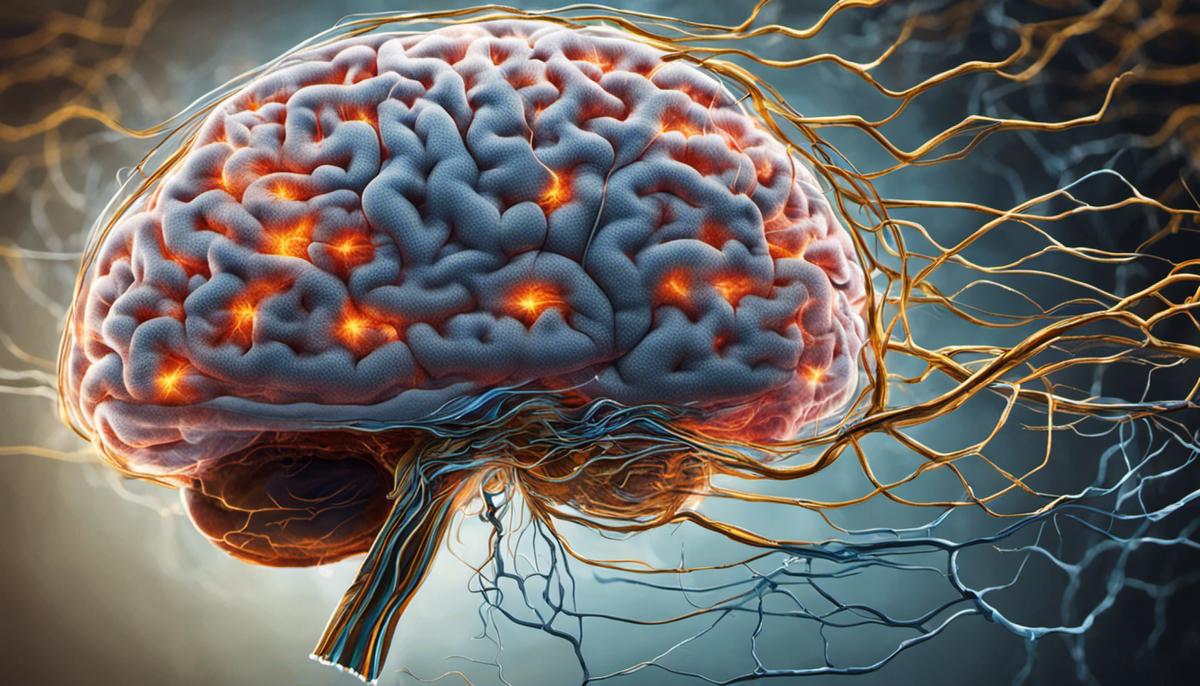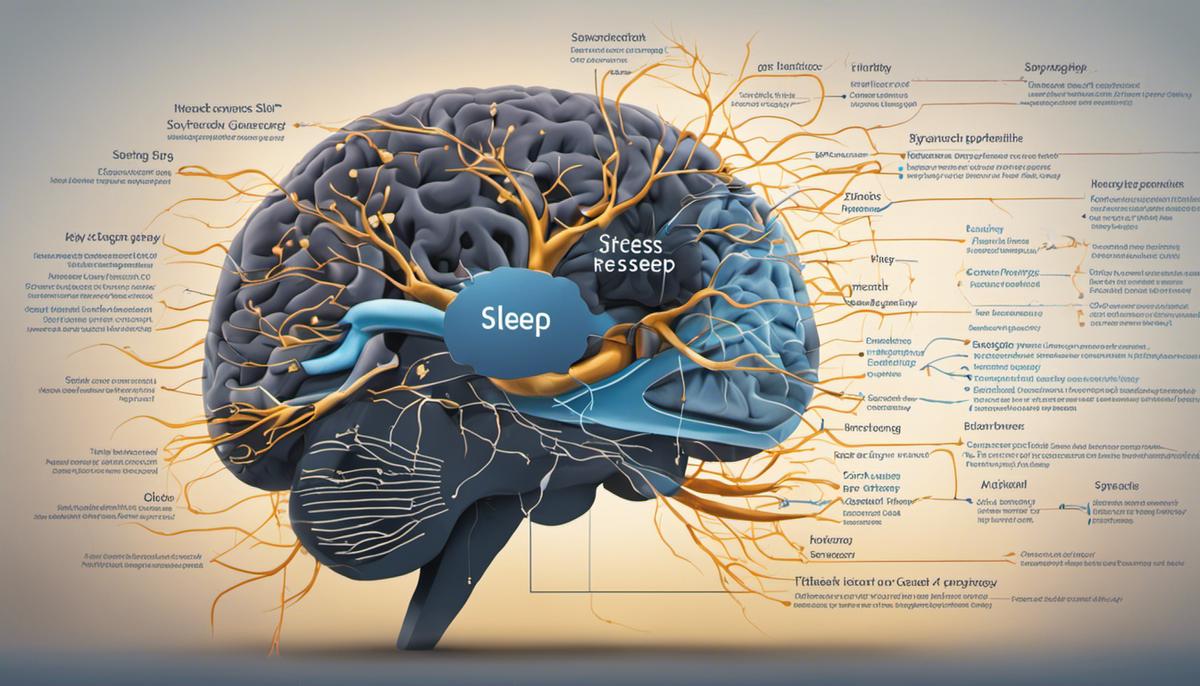In an incredibly demanding world like ours, stress and sleep are two prominent elements deeply intertwined within the human physiological and psychological experience. Our bodies rely on the ample benefits of sleep to maintain functional order and manage the relentless demands of daily stress. This dynamic interconnection affects our mental well-being, physical health and contributes significantly to how well we navigate the pressures of life. We plunge into these complex waters, initially discussing the physiological relationship between stress and sleep, emphasizing how stress hormones such as cortisol influence and are swayed by our sleep cycles. Following this, we delve into the psychological perspective, shedding light on the way sufficient sleep shapes our cognitive abilities, moods, and general mental health. Lastly, we explore how sleep quality can dictate stress management, underscoring the significance of both the sleep cycle stages and a conducive sleep environment.
Table of Contents
The Physiology of Stress and Sleep
The Anatomy of Sleep: Unraveling its Role in Stress Regulation and Physiology
The physics of sleep – an oft-underexplored, yet critically significant realm of neuroscience, has profound implications for our understanding of the human psychophysiological stress response. The mechanistic interplay between sleep and stress regulation has remained at the epicenter of neurobehavioral science, and continues to revolutionize our comprehension of stress-related pathophysiology.
Sleep constitutes an integral component in the circadian orchestration of physiological processes, fundamentally influencing cognition, mood regulation, neuroendocrine function, and immune response dynamics. Hence, a disruption in sleep architecture impacts the body’s physiological response to stress, with potential repercussions radiating throughout the mental health spectrum.
An examination of the hypothalamic-pituitary-adrenal (HPA) axis, the body’s central stress response system, clearly illustrates this intricate biochemical sequel. In a well-rested individual, a precipitating stressor instigates the HPA axis, resulting in the secretion of cortisol – the pivotal ‘stress hormone’. Concurrently, the body’s regulatory mechanisms ensure the precise titration of this response, preventing an overzealous reaction.
However, chronic sleep disruptions, related to sleep deprivation or sleep disorders, might engender a hyper-responsive HPA axis, often resulting in an overshoot of the cortisol response and impairment in cortisol regulatory feedback systems. This dysregulated HPA axis activity embodies a physiological cascade that intersects with a vast swath of stress-related diseases – from mental health disorders such as depression and anxiety disorder, to cardiac disease, and metabolic abnormalities like diabetes and obesity.
Sleep deprivation has also demonstrated a distinct impact on cognitive functions and emotion processing, key domains intricately interlaced with stress responses. Deprivation-induced disruptions in prefrontal cortex function contribute to emotional dysregulation, heightened anxiety, and impaired cognitive flexibility, all of which can exacerbate psychological stress responses.
Notably, sleep fluctuations may also affect the immune-inflammatory response, another physiological substratum often taxed by stress. Research demonstrates sleep loss incites an upsurge in systemic inflammatory markers, possibly incurring a state of chronic low-grade inflammation that heightens vulnerability to stress and related susceptibility to inflammatory diseases.
Furthermore, inadequate sleep has been observed to influence the functioning of the Parasympathetic Nervous System (PNS), integral to rest and relaxation. Essentially, sleep deprivation might possibly deter the ‘rest and digest’ operations of the PNS, stimulating a state of physiological arousal that further buoys the body’s stress response.
In conclusion, the relationship between sleep and stress physiology extends far beyond the remit of rest and recuperation. Unraveling the sleep-stress interface signals a brave new frontier in neuroscience, poised to redefine our understanding and management of stress, its physiology and the myriad health implications therein. The milieu of cognitive neuroscience stands testament to the old adage ‘sleep is the golden chain that ties health and our bodies together’.

The Psychological Effects of Sleep on Stress
Delving deeper into the intricate interplay between sleep and stress, it becomes apparent that a tight loop exists between these two phenomena. This loop not only underscores our day-to-day physiological and psychological states but also plays a crucial role in maintaining our wellbeing. As the understanding stands now, adequate sleep is indubitably essential for optimal stress management, and this association appears to be rooted in the intricate neurobiology that underlies these two critical parameters of human health.
There’s an interesting relationship between brain activity during sleep and the release of neurochemicals associated with stress. Deep, restorative stages of sleep, particularly stage 3 of non-rapid eye movement sleep (NREM), provide the brain optimal conditions for the synthesis and release of growth hormone. Simultaneously, there’s a reduction in the release of stress-related neurochemicals. This curious juxtaposition elucidates the profound influence sleep wields over the body’s stress equilibrium.
Addressing the neurotransmitters’ dynamics during sleep, with particular attention given to serotonin and gamma-aminobutyric acid (GABA), is crucial in understanding how adequate sleep fine-tunes our stress response. Presiding over a slew of brain functions, these neurotransmitters undergo a remarkable rebalancing during a full sleep cycle. Consequently, their dysregulation due to sleep deficiency may precipitate a neurochemical imbalance, exacerbating an individual’s reaction to stress.
Further, sleeping patterns significantly influence the neuroendocrine system of the body. The synchronization provided by a consistent sleep pattern modulates the secretion of key stress hormones, including norepinephrine and cortisol. Disruptions in this synchronization can thus lead to hormonal instability, laying the groundwork for exacerbated stress responses.
One of the less explored but pertinent mechanisms through which sleep modulates stress responses involves regulation of the gut microbiota. More recent research illustrates a bidirectional relationship between sleep and the gut microbiota – the millions of beneficial bacteria residing within our gut. Significant sleep abnormalities have been linked with alterations in this microbiota, which, intriguingly, appears to have reciprocal effects on our anxiety levels and stress responses.
Inadequate sleep can also affect epigenetic control, leading to alterations in gene expressions that necessarily regulate the stress response. Research suggests that chronic sleep deprivation forces these epigenetic changes, which can, in turn, lead to imbalanced stress reactions and susceptibility to stress-related disorders.
Finally, the adaptive coping strategies implemented against daily stressors begin to unravel with the consistent onslaught of sleep insufficiency. The evolved balance of confrontation and surrender to stress situations, known as the ‘fight or flight’ response, can tilt dangerously towards over-reactivity or complete retreat due to deficient sleep.
A thought-provoking exploration of the role of sleep offers substantial insight into the relationship between these fundamental contributors to human health. While this discussion highlights the profound influence of adequate sleep on the overall stress response mechanism, it is to be remembered that the delicate ballet of the human body’s physiological mechanisms involves countless other intricate choreographies. This exploration merely underscores one such dance in the magnificent sonnet that is human biology. We are left with a crystal-clear understanding and newfound appreciation for the world of sleep and its pivotal role in stress modulation.

The Impact of Sleep Quality on Stress Management
Moving further from circadian rhythms and the HPA axis, it becomes noteworthy to delve into the intellectual and biological confluence of sleep and stress, where both the physiological and psychological states intertwine to create distinct outcomes. The aspect of sleep as an essential restorative function is inseparable from the cerebral activities that transpire during its various stages.
Bioelectrical brain activity during sleep stages significantly modulates the release of neurochemicals associated with stress regulation. Among several candidate neurotransmitters, serotonin and gamma-Aminobutyric acid (GABA) assume crucial roles in the sleep-stress dynamic. These neurotransmitters primarily act as sleep facilitators, bolstering the inhibitory processes that contribute to successful sleep initiation.
While serotonin promotes relaxation and mood stabilization, GABA inhibits excessive brain activity and facilitates deep sleep. Their regulatory functions on the nervous system are critical, not just for sleep health but also for overall stress modulation.
Sleep patterns can significantly influence the neuroendocrine system, too. Effective sleep hygiene safeguards the proper secretion and balance of hormones, which in turn plays an imperative role in managing the physiological contributors to stress. A lack thereof can skew these crucial pathways, thereby leading to exacerbated stress reactions.
A less explored yet fascinating aspect of sleep research is centred around the bidirectional relationship between sleep and the gut microbiota. Emerging evidence suggests that these ‘gut bugs’ can influence sleep quality by affecting the release of sleep-promoting neurotransmitters, while sleep disturbances can alter the diversity and function of the microbiota, leading to possible stress amplification.
Beyond the confines of microbes, sleep profoundly impacts our genetic machinery. Insufficient sleep can result in aberrant epigenetic control, altering gene expression patterns linked to stress reactivity and coping mechanisms. This signifies a profound biological complexity wherein the effects of sleep deprivation surpass immediate cognitive deficits and extend to long-term molecular changes.
Sleep insufficiency significantly disrupts adaptive coping strategies too. Individuals grappling with inadequate sleep are more likely to respond to stressors with heightened emotional reactions, exhibiting an impaired ability to manage stress effectively. This elevates the risk associated with a wide range of psychological conditions including anxiety disorders and depression.
Hence, the exploration of the sleep-stress interface indeed uncovers a labyrinth of causative pathways and consequential outcomes. But the central revelation remains clear – that quality sleep is of genuine consequence for the modulation of stress and the broader arena of human health. Recognizing this premise, and acting upon it, should be of utmost priority and is indeed a step towards enabling improved physiological wellbeing and mental health.

Understanding the intertwined web of stress and sleep is an offering of empowerment, allowing us to take informed and conscious control over our well-being. Proactive endeavors to prioritize quality sleep can lead to monumental shifts in our emotional health, cognitive function, and overall stress resiliency. The importance of sleep extends beyond mere luxury or an indulgent pastime, but rather, it is a fundamental pillar for effective stress management and overall health. Life’s challenges may not cease, but with enough sleep, our capacity to handle, adapt, and thrive amidst these stressors can significantly transform for the better. Hence, sleep, in all its stages and forms, is a non-negotiable essential, acting as an essential ally in our lifelong journey of managing and reducing stress.

Rajan Moonbeam is a dedicated health writer with a Master of Public Health (MPH) degree. Specializing in holistic wellness and preventive care, Rajan combines scientific research with natural approaches to health, offering readers practical advice on living their healthiest life. His work is a beacon for those seeking to navigate the path to well-being with integrity and balance.

